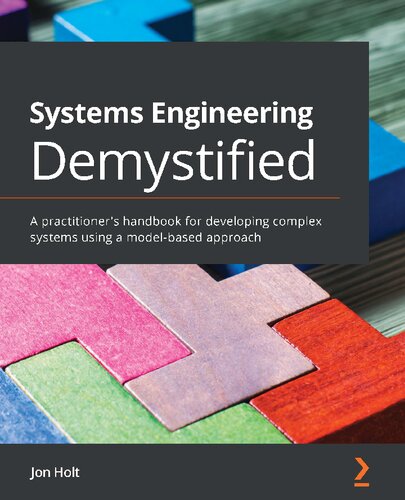

Most ebook files are in PDF format, so you can easily read them using various software such as Foxit Reader or directly on the Google Chrome browser.
Some ebook files are released by publishers in other formats such as .awz, .mobi, .epub, .fb2, etc. You may need to install specific software to read these formats on mobile/PC, such as Calibre.
Please read the tutorial at this link: https://ebookbell.com/faq
We offer FREE conversion to the popular formats you request; however, this may take some time. Therefore, right after payment, please email us, and we will try to provide the service as quickly as possible.
For some exceptional file formats or broken links (if any), please refrain from opening any disputes. Instead, email us first, and we will try to assist within a maximum of 6 hours.
EbookBell Team

4.3
58 reviewsGet to grips with systems engineering life cycles, processes, and best practices and discover techniques to successfully develop complex systems
Key FeaturesSystems engineering helps us to understand, specify, and develop complex systems, and is applied across a wide set of disciplines. As systems and their associated problems become increasingly complex in this evermore connected world, the need for more rigorous, demonstrable, and repeatable techniques also increases.
Written by Professor Jon Holt – an internationally recognized systems engineering expert – this book provides a blend of technical and business aspects you need to understand in order to develop successful systems. You'll start with systems engineering basics and understand the complexity, communication, and different stakeholders' views of the system. The book then covers essential aspects of model-based systems engineering, systems, life cycles, and processes, along with techniques to develop systems. Moving on, you'll explore system models and visualization techniques, focusing on the SysML, and discover how solutions can be defined by developing effective system design, verification, and validation techniques. The book concludes by taking you through key management processes and systems engineering best practices and guidelines.
By the end of this systems engineering book, you'll be able to confidently apply modern model-based systems engineering techniques to your own systems and projects.
What you will learnThis book is for aspiring systems engineers, engineering managers, or anyone looking to apply systems engineering practices to their systems and projects. While a well-structured, model-based approach to systems engineering is an essential skill for engineers of all disciplines, many companies are finding that new graduates have little understanding of systems engineering. This book helps you acquire this skill with the help of a simple and practical approach to developing successful systems. No prior knowledge of systems engineering or modeling is required to get started with this book.